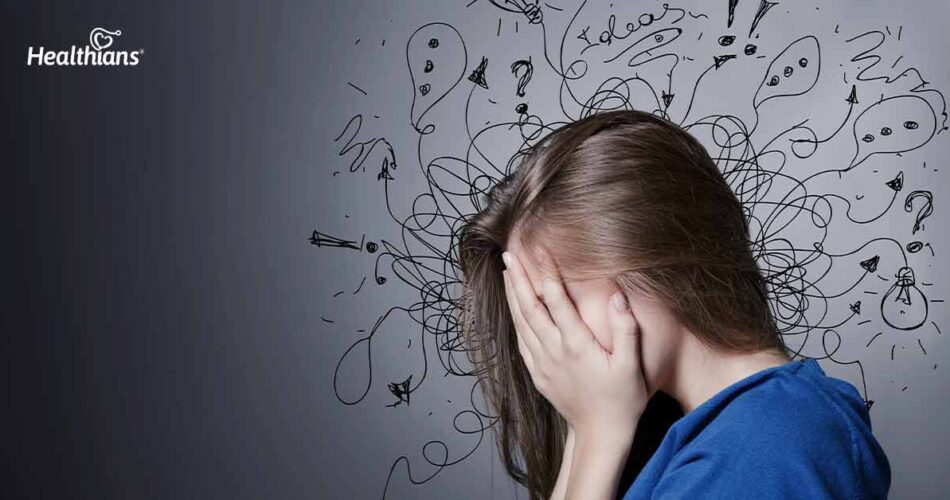Contributed by: Healthians Team
Introduction
Anxiety is an emotion that can give rise to worrying thoughts, making you feel tense. Nowadays experiencing anxiety is a normal part of life.
Getting occasionally anxious is normal. It can motivate you to tackle situations that are unfavourable or threatening.
Anxiety symptoms may start during childhood or the teen years and continue into adulthood.
However, it is a matter of concern if the episodes of anxiety become recurrent.
Sometimes symptoms of anxiety can be hard to detect.
Here are a few examples of anxiety disorders you need to pay attention to including generalised anxiety disorder, social anxiety disorder (social phobia), specific phobias etc.
Sometimes anxiety results from a medical condition that needs treatment.
If you have symptoms of an anxiety disorder, talk to your healthcare provider. They’ll start with a complete medical history and physical examination.
However, there are no lab tests or scans that can diagnose anxiety disorders. But your provider may run some of these tests to rule out physical conditions that may be causing symptoms.
Here are some signs and symptoms that are common among those with most types of anxiety disorders.
Restlessness
Restlessness is another common symptom of anxiety, especially in children and teens.
Some individuals often describe restlessness as feeling “on edge” or having an “uncomfortable urge to move.”
Excessive worry
Excessive worrying is one of the most common symptoms of anxiety disorder. A doctor will diagnose someone with a generalized anxiety disorder if this worrying occurs on most days for at least 6 months and is difficult to control.
Generalized Anxiety Disorder, GAD, is an anxiety disorder characterized by chronic anxiety, exaggerated worry and tension, even when there is little or nothing to provoke it.
Do you know women are also twice as likely to have a generalized anxiety disorder than men, and the disorder commonly occurs alongside major depression?
Sleeping problems
Sleep plays a crucial role in boosting mental health and controlling anxiety symptoms.
Do you know sleep disturbances have a strong association with anxiety disorders?
Experts recommend that a person should aim for at least seven to eight hours of sound sleep every night.
Do you know sleeping disorders and anxiety are reciprocal to each other? If any of them afflicts, the other is bound to occur.
Therefore, it’s best to talk to your doctor to determine the underlying causes and what you can do to correct them.
Irrational fears
Extreme fears about specific things such as spiders, enclosed spaces, or height could be a sign of a phobia. A phobia is an extreme anxiety or fear about a specific object or situation.
Some examples of phobia may include animal phobia, situational phobia (like an aeroplane or elevator ride), natural environment phobia (like floods) etc.
Panic attacks
Panic disorder is another type of anxiety disorder that involves repeated episodes of sudden feelings of intense anxiety and fear or terror that reach a peak within minutes (panic attacks).
During a panic attack person may experience sweating, shaking, rapid heartbeat, chest tightness etc.
These panic attacks may lead to worrying about them happening again or avoiding situations in which they’ve occurred.
Compulsive behaviours
Obsessive-Compulsive Disorder, OCD, is an anxiety disorder and is characterized by recurrent, unwanted thoughts (obsessions) and/or repetitive behaviours (compulsions).
Repetitive behaviours may include hand washing, counting, checking, or cleaning are often performed with the hope of preventing obsessive thoughts or making them go away.
Obsessive thinking and compulsive behaviour are also known as “rituals”. However, it provides only temporary relief and they need to complete the behaviours.
Social phobia
Social anxiety disorder doesn’t always involve speaking to a crowd or being the centre of attention. It is characterized by overwhelming anxiety and excessive self-consciousness in everyday social situations.
Social phobia disorder involves high levels of anxiety, fear and avoidance of social situations due to feelings of embarrassment, self-consciousness and concern about being judged or viewed negatively by others.
Muscle tension
Having tense muscles on most days of the week is another frequent symptom of anxiety.
Constant tense muscles such as clenching your jaw accompanied by teeth grinding, clenching your fists, or flexing muscles throughout your body—often accompany anxiety disorders.
It’s possible that muscle tenseness itself increases feelings of anxiety, but it’s also possible that anxiety leads to increased muscle tenseness.
Flashbacks
Post-Traumatic Stress Disorder, PTSD, is an anxiety disorder that can develop after exposure to a terrifying event or deal in which grave physical harm occurred or was threatened.
Traumatic events that may trigger PTSD include violent personal assaults, natural or human-caused disasters, accidents, military combat, etc.
Final thoughts
Avoiding the onset of anxiety may be unavoidable, but taking measures to control its aggravation is in your control.
Furthermore, you should also frequently opt for stress screenings. Proper treatment of anxiety will be helpful to avoid certain severe mental health problems.
Also, learning how to stop worrying constantly can also help you avert or manage anxiety disorder, effectively.
Additionally, most researchers conclude that anxiety is genetic but can also be influenced by environmental factors.
Sometimes, parents can transfer anxiety into their children’s genes. In order to determine how vulnerable you might be to acquiring hereditary anxiety, genetic testing is your best option.
Genetic testing is a cutting-edge predictive health tool to ascertain your predisposition toward any kind of medical condition.
As an add-on, make a habit of taking preventive health checkups as they can help you in getting a complete insight into your health.
This will also help you with taking measures to promote your overall well-being.




